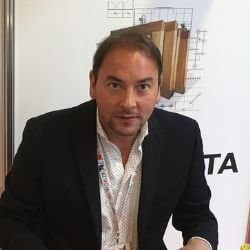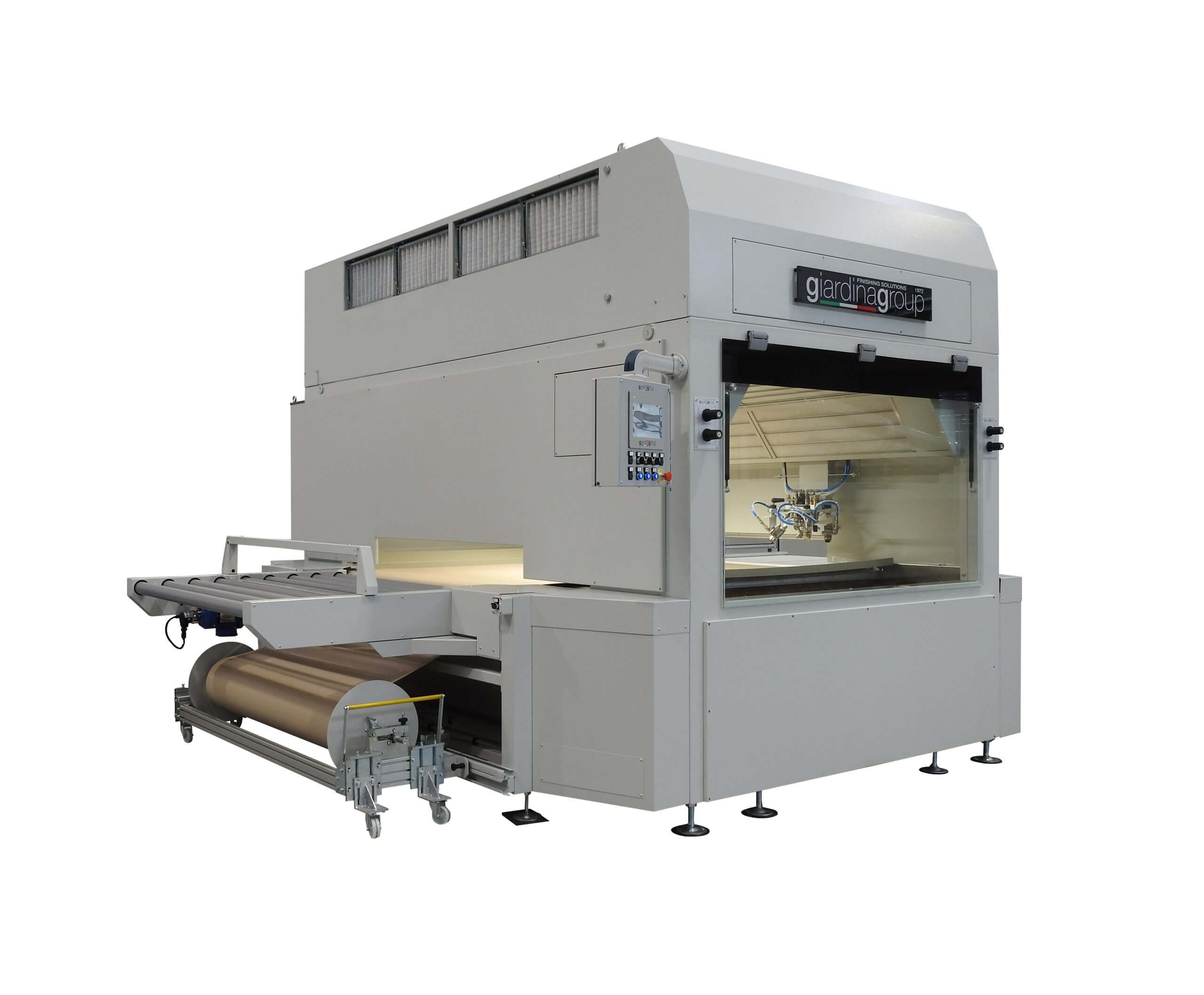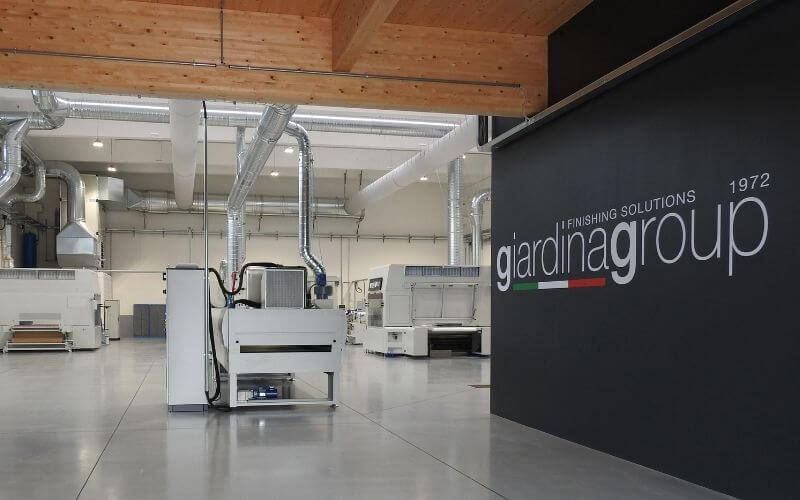« Quality, competence and reliability are our values » interview with Carlo Di Cerbo, Giardina Group Sales Area Manager
A new edition of this column celebrating the fiftieth anniversary of Giardina Group, the Figino Serenza-based finishing specialist. We celebrate this birthday by talking about the people, men and women who work day-in-day-out and who have made this brand one of the most valued and recognised in the industry. After interviews with Stefano and Riccardo Mauri (read more), the owners, and sales manager Stefano Tibè (read more), it is now the turn of Carlo Di Cerbo, the group’s sales area manager for central Italy and eastern Europe. He tells us about a career path inextricably bound to that of the Giardina Group.
 “My long history at Giardina Group began in 1996 when I joined the technical department of Ventilazione Italiana, a company manufacturing ovens and extraction systems. After this experience – and a few years as a consultant – in 2004, I joined Giardina Officine Aeromeccaniche as area manager for Indonesia, Malaysia, China and Russia. Over the years, changing target markets and following the company’s decisions, I ‘moved’ further east. After almost eighteen years, I am now the sales area manager for Eastern Europe, Poland, Ukraine, Romania, Belarus, and central Italy.”
“My long history at Giardina Group began in 1996 when I joined the technical department of Ventilazione Italiana, a company manufacturing ovens and extraction systems. After this experience – and a few years as a consultant – in 2004, I joined Giardina Officine Aeromeccaniche as area manager for Indonesia, Malaysia, China and Russia. Over the years, changing target markets and following the company’s decisions, I ‘moved’ further east. After almost eighteen years, I am now the sales area manager for Eastern Europe, Poland, Ukraine, Romania, Belarus, and central Italy.”
Different markets, different approaches?
“Exactly. Every market, country, and customer needs a different approach. They have different requirements: from the product they want to process to the coating cycles they wish to perform, with all the associated aspects. For example, Italy is a very advanced wood-processing country, so our Italian customers are particularly aware of the product.
In the domestic market, technology makes the difference; every aspect of the machine, the line and the installation. For example, in Poland, Belarus and Romania the relationship of trust between producer and customer is paramount, although without product quality, you get nowhere. Also, for reasons of distance, of course: if you choose a ‘foreign’ technology manufacturer, you want to be confident that they are always available for any need. And indeed, our after-sales service is one of our strong points…”
So what values do customers see in the Giardina Group that persuade them to choose you?
“I don’t even need to think about it to reply: technical competence. Our staff are highly trained, so we can offer our customers an accurate, attentive, in-person after-sales service, which has always been our added value. When someone buys one of our machines, they know they can always depend on us at any time, seven days a week. This may seem an almost ‘banal’ answer, but it is a fact.
This technical expertise enables us to offer advanced, high-quality technology that guarantees high-level workmanship. Because, in the end, the difference is and always will be product quality. Without that, you can’t make it to your fiftieth anniversary…”
What are the most popular products in Eastern Europe?
“I would say the more traditional technologies, like spraying. Producers in these markets need more flexibility, and above all systems that can be adapted to the needs of the moment, which can alternate between ‘scaled’ and ‘one-batch’ production. Our ‘Dualtech’ range, with the ‘Dualtech 400’ at the forefront, is proving very successful. In addition, vertical ovens and ‘GPMs’ continue to enjoy a healthy market share.
However, as far as newer technologies are concerned, we have seen, for example, strong interest in excimer technology in recent years, but it will still take time for it to become a must-have.”

Carlo di Cerbo continues: “Again, speaking of Eastern European markets, we are achieving great success, particularly in the Polish and Romanian markets. As I said, having direct contacts is crucial in markets like these. In Poland and Romania, we have excellent, well-trained and organised agents enabling us to expand our horizons in these countries further.”
And how has the market changed in Italy in recent years?
“We have to start from the premise that, in terms of plant engineering, Italy has always been a highly advanced country, full of investments and investors. Above all, at the turn of the 1980s and 1990s, when almost all companies expanded their production and upgraded their machinery. This led, in the early 2000s, to companies stopping, slowing down investments, and putting their resources into other areas that gave a solid boost to, among others, the second-hand market. However, in recent years, this trend has definitely changed. For example, the shift to « Industry 4.0″ has revitalised the market thanks to funding, subsidies, and the need for sustainability, creating excellent opportunities for companies that want to modernise their lines and, as a result, ensuring an expansion of the manufacturers’ market.
What have been the most interesting ‘challenges’ to face and – why not – to overcome?
There have been many. Many complex, engineering-rich systems. We at Giardina Group have always been known for our ability to structure complex, special non-standard systems to enable our customers to meet their needs. This is why we can say that 90 per cent of our turnover until a few years ago came from our being more of a ‘specialist’. Since Destefani joined Giardina Group, we have embarked on a new path and choices to create standard machines that optimise production.
This new path is proving to be very stimulating for all of us.

A new path, new ideas and new directions that clashed for obvious and global reasons, with two years marked by uncertainty…
“The main problem for us was the difficulties in travelling, especially in 2020. This complicated customer relations, particularly in some markets where ‘direct’ relationships are more important. Of course, we managed to compensate with technology for what we previously did with human contact. However, it is clearly not the same thing, and the new tools that this ‘complicated’ two-year period has bequeathed us cannot replace the human approach. To be honest: in our industry, the customer wants to see and touch the machines, the lines. They want to test the machines, to understand by discussing with us how to achieve the best solution. And for that, you need time, contact, and humanity; as I said, that will never be the same through a screen.
It was essential to deal with these two years because it gave us a clearer understanding of what we are like and the new technologies that we had but still only partially used. But we are delighted to be almost entirely back to normal.”